#comics industry
Text
I hate comics pirating discourse because it inevitably always comes down to writers/artists being understandably upset they're not getting paid but choosing to invent imaginary people to get mad at instead of getting angry at their bosses for refusing to pay them and be competent at their job of running a functional publishing company
341 notes
·
View notes
Text
Official released art of characters: ⚪️
Tumblr artists: it's my sacred duty to make this boy brown or so help me fandom gods
#and it rocks every time#dc#batfam#and extra points to artists who give Duke extra Black hairstyles for fun and sport. I love you#marvel#comics industry#media studies
121 notes
·
View notes
Text

OK, so you are looking at a comic I did back in 1990 that changed my life in so many ways. Not the way you’re thinking of.

It taught me some very important lessons about the comics business, fame, and more importantly, how fame doesn’t rub off. And how having reasonable expectations will keep you centered and on the right path.
Many people don’t internalize this lesson. And now that our industry is no longer just Fandom Culture but is now Celebrity Culture, we see more and more creators with incredibly unrealistic expectations getting into comics, expecting the sun and moon to rise out of whatever they do, and being disappointed and frustrated when they don't.
I got occasional mainstream comics work in the early 1980’s, but I was still looking for my big break years later, especially since a major gig I was working on got shelved forever. I cannot even begin to tell you just how much being out of the eyes of the market for YEARS at a time while you work on a gig - and then the gig never coming out - can absolutely sink your brand.
Nowadays we have social media. Back then, you had no way to be seen if your work wasn’t being published. People forgot about you in about 15 minutes.
So when I got a gig working on Amazing Spider-Man, you bet I was thrilled. And even more thrilled when the darned thing sold like crazy. This issue of Amazing Spider-Man outsold previous Todd MacFarlane issues. And I knew Marvel was looking for a new artist. Huzzah! I outsold Todd! Maybe the new artist should be me!
You can imagine how pleased and excited I was to go to conventions and sign copies of a book that hundreds of thousands of fans bought. It was fun getting my first big lines of fans. I thought it would be a perfect opportunity to push my other works to them as well.
But few Spider-Man fans were interested in my other books. They could not possibly care less about Amethyst: Princess of Gemworld, that’s for sure.
The Spider-Man glow was gone in no time. And Marvel picked Erik Larsen to be the regular artist.
I might as well have never worked on Spider-Man for all the long term good it did. Were it not for that one brief shining moment of royalty check (which was darned good,) it had no effect on my prospects.
While I got more work at Marvel, I was scrambling to make a living and took on too much, doing sub-par art that didn’t please anyone.
I realized pretty quickly that Spider-Man’s fans weren’t my fans. I might as well have been a spark plug on that issue. Fans lined up, got me to sign a book, and forgot about me the next day.
(Yeah I know some people say they love that comic, but I often hear from people who tell me how much they hated my art back then and how much they grew to love it later. Thank you, I’ll take it.)
Anyway, it was all a very tough lesson. But I appreciate that I learned it early before I got to the point where I could never learn it.
Fame isn’t transitive. It doesn’t rub off.
The public needs more than your proximity to something they know to transfer their attention to you and your work.
A lot of people got a taste of this in the early 1990’s. For a while, self-publishing was The Big Thing. I self published A Distant Soil and did well for some years, at one point making more than I could in mainstream comics, until the market crashed in 1996. A lot of creators thought if they just went to Image Comics, they’d all be millionaires.
That didn’t happen for almost all of them.
An old frenemy saw how well I was doing self publishing and assumed that if they just transferred their mainstream comics fan base to their creator owned work, they’d get rich.
But that didn’t happen. Their self-published work sold a fraction of what mine did. Their project died in the red. I never got my art back, including work from an unpublished future issue of the project. I remember being with this creator at a show and enduring their fury at how fans weren’t paying attention to them and their project.
How could this happen? They were a star mainstream creator!
The mainstream cred did not transfer to the other work. The fans wanted the famous characters, not the indie project they were trying to push.
There was no point in explaining this either. I’d learned this lesson myself, but this person never learned it.
Most people never learn it.
How is it that I work on Famous This or with Famous Person and why am I not famous Too?
Because fame isn’t transitive.
I’ve worked on projects that got a lot (and I mean a lot) of buzz, but there are projects that didn’t necessarily set the world on fire that did more for me as an artist and for my finances than “big” projects did.
Reign of the Zodiac and The Book of Lost Souls, both early/mid 2000’s comics with mediocre sales set me on a solid financial footing because they are two of the few regular monthly gigs I’ve done in all my years working in comics. That monthly paycheck paid more than the projects I’d done before them. The financial and emotional stability was beyond price. I loved everything about those projects.
Except for their premature demise.
The one and only famous project that had a major transformative afterglow effect re: me and my work was Sandman. I met Neil Gaiman years before I worked on Sandman, before he was famous. I only worked on two issues. Many other artists were far more important to the project than me, of course. Then I went for nearly twenty years solid without working with Neil at all except on a pinup and short story adaptation of Troll Bridge that almost no one remembers.
I started working with Neil again when he saw some art I did for a book for Tori Amos back in 2008. Tori Amos fans didn’t flock to my side when they saw it, yet another example of how Famous People Fame Doesn’t Rub Off. But I lavished time and attention on the project, did the art on spec with a completely new style and process, and showed it to Neil. I asked Neil if he’d take a chance at working with me again after lo, these many years and let me have a go again at adapting the story Troll Bridge that I’d botched in 1998. Neil said yes.
After The Book of Lost Souls got killed back in 2006, I could barely get arrested in comics and I wasn’t sure I had a future. I was shocked that Neil said yes.
That Tori Amos job reestablished my working relationship with Neil and brought me to Dark Horse Comics, a publisher which had shown little prior interest in my stuff.
It took me years to complete Troll Bridge and during that time, Peter David contacted me to ask if I’d work on Stan Lee’s autobiography. That came out of the blue, and boy did I appreciate it. It sold like crazy, which was unexpected, really.
So I went from Not Being Able to Get Arrested in Comics in 2008, doing 1$ sketch cards and working for page rates I worked for in 1986, to Not Being Able to Remember What I am Doing Because I have Too Much To Do in 2022. I mean literally couldn’t remember I did a pinup for a gig back in February, and I not only forgot about it, I didn’t know it was published last June.

It looks like I had a super fast and fun run up if you’re just looking at my highlight reel. But it wasn’t. I’ve had peaks and valleys, (a few very fine peaks, the best being around 1993 and the other now), and sometimes the “big time” projects I thought would make my career held me back worse than the “small time” ones. “Big time” projects got shelved or came and went, quickly forgotten, and I said no to other projects while I was busy, and the one that got away ended up getting made into a multi-million dollar film franchise that would have set me up for life.
Ow.
If just being next to a famous person or working on a famous project was a guarantor of success, than I’d have been hugely successful every day of my adult life.
That is not how it works.
Even the famous people are not as all that as you think, otherwise you wouldn’t see so many actors with haunted looks on their faces at conventions.
I met Neil before he was famous, but it took over thirty years for me to establish a solid working relationship with him.
Thirty.
Years.
I’ve worked with famous wrestlers, actors, musicians, politicians, a Pulitzer Prize winning author, and on almost every single major licensed character there is. And I’m not super-famous or rich. I mean, I never wanted to be famous in the first place, but I’m not completely unknown in my field, and I’m not poor (anymore). Still, seriously, folks. I’m not going to movie premieres and living in Hollywood.
I actually get asked about that, and I think it’s so funny.
I was watching some recent art auctions, and I was absolutely shocked to see original pages by an Eisner-nominated creator go for rock bottom prices, mainstream interiors at around $50 per page. I could not believe it. This artist is over 40 years old. I wonder if things will turn around for them.
Time will tell.
In the end, it’s not all about the people you’re standing next to. Or the character. Or the company. Or the award. And it's certainly not all about you.
Fans are here for you one minute, and forget about you tomorrow. Then you get $50 for your Eisner nominated art.
Art either takes off or it doesn’t. You either take off or you don’t.
And then you can fly too close to the sun and fall.
Worse yet…you just fade and no one even notices that you crashed beautifully into the surf.
If people knew what the magic formula was, they’d be selling it and everyone would have what they want out of their art life.
But there is no magic formula. There just isn’t.
Everyone wants to be special to someone. Especially artists. Everything you create is special to you.
But it is extremely rare that what you create is as special to others as it is to you. Sometimes artists are just like everyone else.
Here and gone.
Fame and success is not transitive. And they're not forever.
That’s the lesson.
I'm working on Good Omens right now. The Kickstarter pre-sign up news is here. No, it's not an icky newsletter, it will just let you know when the Kickstarter launches.
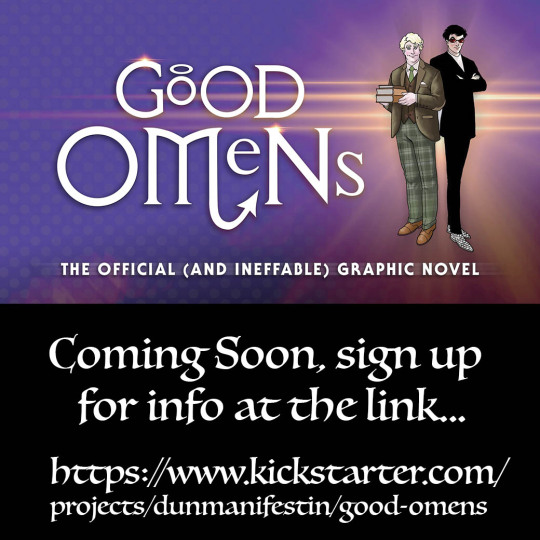
I have a Patreon. I'm funding the final volume of my space opera A DISTANT SOIL with it, but I won't be working on it again until Good Omens is complete. I have one of the most active and productive Patreons on the site.
I'm also on Twitter and Facebook and Instagram. Not too much though, they are distraction pits.
Make art because you love it. Because the rest...well, good luck. If it happens for you...it happens. And I hope it does.
153 notes
·
View notes
Text
I just saw somebody describe DC not going with the trans-girl Kon proposal as them 'canceling' it and just...
It doesn't matter. It doesn't matter. I know it doesn't matter, but.
Words mean things. That proposal was not something that was going to happen that got canceled for being too queer. That was a pitch. One of probably dozens DC would've fielded from their various creators while figuring out what to do next with Kon's story.
I am, legit, genuinely surprised that we ever saw it, because DC has a strict policy where they won't even hear an elevator pitch until after you've signed an NDA. Possibly multiple NDAs.
It is not weird or cowardly or some big negative sign that it didn't get made. Most pitches never get made. That's the nature of the industry. That's the nature of most creative industries. It is just as likely that they didn't go with it because it was too ambitious (12-24 issues!) or because the editor didn't agree with her take on the character as because of the trans thing.
It's cool that we get to see the pitch but it's honest to god not something to get all up in arms about, sheesh.
#dc comics#comics industry#does anybody happen to have the context of how it got onto the internet?#the reddit post seems to have been deleted and I'm mostly hoping nobody got in trouble for letting it out#you never know with the corporate NDAs
70 notes
·
View notes
Text
Since it's been coming up again, here's a free, downloadable version of A Brief Guide to the Comics Industry for Mental Health Professionals.
N. B.:
This is intended for personal use, only. If you want to print, distribute, or extensively quote it, email jay.edidin(at)gmail(dot)com.
I am not a mental health professional.
The information in the guide is fairly specific to comics creators and publishing professionals. If you are looking for tools to explain comics from a fan perspective, this will probably not be useful to you.
21 notes
·
View notes
Text
#ComicsBrokeMe has been gaining steam on Twitter over the past two days, but I haven't seen a whisper of it on my dash here. The Bleeding Cool article summarizes some of the major threads.
Neil Gaiman amplified the hashtag yesterday, as did Frank Miller of all people.
To summarize: the industry is terrible. It's always been terrible, and it's getting worse. Page rates are less than they were ten years ago; deadlines are getting shorter. And it's not just the Big Two (Marvel has always been a meat grinder, but DC is almost as bad), but the majority of the indie publishers too. Digital publishers aren't exempt from this either.
If you can stomach going over to the blue check nonsense site, I would recommend scrolling through the hashtag.
58 notes
·
View notes
Note
Hey, I'm the anon who mentioned feeling suffocated in the comics industry a while back. I was wondering if you, or any of your followers, knew of any sort of database or professional org or anything similar of Jewish artists? Or hell, if any of your followers are artists looking for work? I'm working on a comic project that has some serious prospects (an agent is interested and confident they could sell it) but I need an artist and I am just........tired of wading through profile after profile of artists committing Simon of Trent-style blood libel. So hell, why not just seek out a Jewish artist specifically, right? But uh, looking up "list of jews in the arts" leads to....non-ideal results rn. :P
This is a follow-up to this ask.
I was able to find this listing of Jewish comic art vendors related to this exhibition. If any readers know of other examples, I ask that they please share them in replies. Thank you.
And best of luck, anon!
7 notes
·
View notes
Text
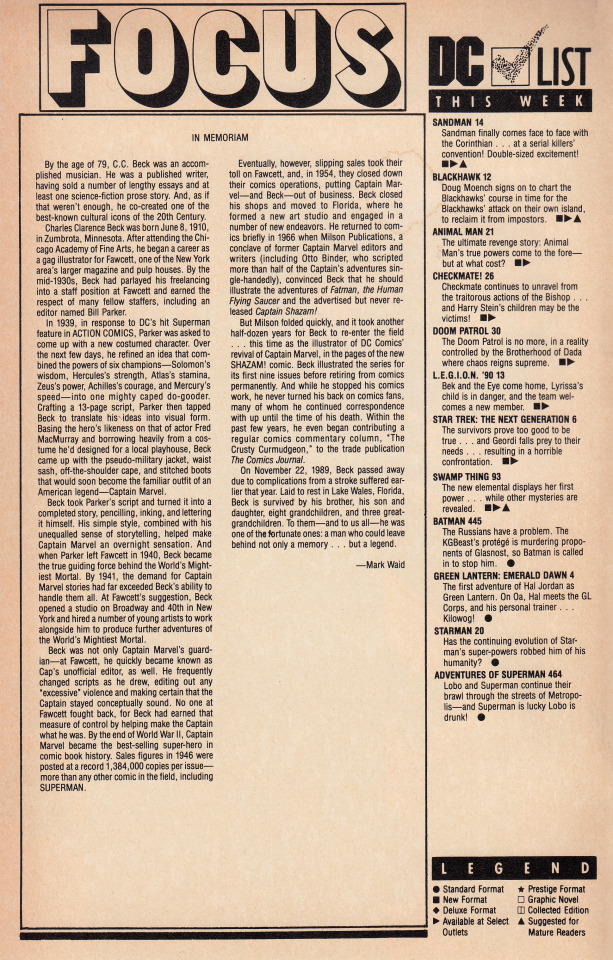
C.C. Beck obituary from March 1990
#obituary#c.c. beck#cc beck#mark waid#comics industry#captain marvel#shazam#comics history#dc comics#comics#90s comics
7 notes
·
View notes
Text
Five reasons why it was much easier to release comic books in the '80s than it is now!
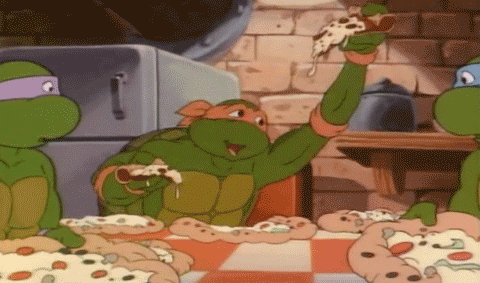
In the thriving world of comic books, the 1980s are often hailed as a golden era, a time when it was much easier to release a comic book compared to the challenges faced by creators today. Let's delve into five reasons why this decade was more conducive to aspiring comic book artists and writers.First and foremost, the editorial landscape of the 1980s was notably less complicated. Back then, all it took was a compelling idea with potential to secure a publishing deal. There were fewer hoops to jump through, and creators had more freedom to explore their creative visions without being bogged down by excessive red tape.Furthermore, the artwork during this period was undeniably superior in terms of aesthetics. The graphic quality of illustrations was top-notch, showcasing the immense skill and talent honed by seasoned professionals. Both writers and artists in the '80s were true masters of their craft, and there was a mutual respect for the art form that elevated the industry as a whole.In addition, the level of competition was significantly lower in the 1980s. The comic book industry was still relatively young, allowing newcomers to break into the scene with relative ease. Unlike today, where the market is oversaturated and fiercely competitive, aspiring creators in the '80s had a better chance of making a name for themselves without getting lost in the crowd.Another key factor that made releasing comic books in the '80s more accessible was the absence of crowdfunding platforms. In today's digital age, crowdfunding has become a popular avenue for creators to finance their projects and build a loyal fan base. However, in the '80s, creators had to rely on traditional publishing methods, which, although more challenging, fostered a stronger sense of community and camaraderie among industry professionals.Lastly, the ethos of storytelling in the 1980s was deeply rooted in meaningful narratives that went beyond mere entertainment. Each comic book was infused with a moral message, social commentary, and profound thought-provoking themes. Creators were driven by a genuine desire to inspire and provoke thought, leading to a richer and more intellectually stimulating reading experience for audiences.Overall, the 1980s offered a more favorable environment for releasing comic books due to its simplified editorial process, exceptional artwork quality, lower competition, lack of crowdfunding reliance, and a greater emphasis on storytelling with substance. While the landscape of the industry may have evolved over the years, the legacy of the '80s as a thriving era for comic book creators remains undeniable.
#digital art#1980s#80s#comics#comicbook#comicbooks#comicart#comic books#Comic book#comic book art#comics industry#Ninth art#graphicnovel#graphic novel#graphic novels#quadrinhos#Quadrinho#bande dessinée
3 notes
·
View notes
Text
i am begging american comic book writers to look at our country’s foreign policy in an era that isn’t world war ii
3 notes
·
View notes
Text
I just learned an artist whose work I've been following since Adventure Time has passed. Although I didn't know him personally, the news is so sudden, it's sort of hard to process next to other things happening.
It just makes me think of how litte-valued comic artists can be, even in a country where arguably, comics actually get paid and seen as art at all. But it's an industry all the same.
Rest in Peace Ian McGinty.
8 notes
·
View notes
Text
We're Back, A Blog Story?
Hey, long time no see, huh?
I'm back from the longest hiatus this blog's ever gone on. And for today's entry, I'm just going to briefly recap what's been going on because I think it'll touch on a lot.
Last time I updated, I did the second part of a big ask me almost anything and we covered a lot of ground, both fun and the sort of questions that're burning for upcoming creators. That week, I was thinking about what was next and how to follow it up. And then IDW underwent significant layoffs and it threw things off for me and plenty of other folks. I am still at IDW, but a lot of my friends and co-workers suddenly were not.
For what it's worth, I know a lot of them are still seeking employment. This includes, among others, Anna Morrow, Megan Brown, Devon Ashby, Zac Boone, Julia Borden, Keith Davidsen, Alex Hargett, Greg Gustin, Blake Kobashigawa, Jonathan Manning, Shawn Lee, Jack Levesque, Hanna Lafferty, Topher Alford, Nachie Marsham, and seriously, so many folks. I apologize to anyone I missed. If you're looking for experienced sales, marketing, production, foreign licensing, or editorial folks, there're a ton of good ones still on the market (as an aside, my pals Chris Mowry and Caleb Goellner are also fairly freshly available).
That was pretty freshly on my mind for Becca's next event, Fangaea, that weekend. I had mentioned that last post. It went alright. I did not stay for very long because even a little one day show like that was a lot in light of what had just happened.
Within the next week, the Writers Guild of America went on strike. Currently, they are still on strike. You can check out what they're asking for here. Unsurprisingly, a lot of it boils down to fair wages, especially in the newer forms of media that have become commonplace over the past 15 years. There's more, like treating each writer in a writing team as an individual and, hey, not using AI. At the end of their negotiation table, the WGA points out that the benefits and raises they're asking for come out to about $429 million per year across all members of the guild and split between all negotiating companies. That may sound like a LOT of money, right? I checked. As of today, with it available for home release, you can still see the Super Mario Bros. Movie in theaters in San Diego. It's box office is over $1.3 billion. Even when you remove the budget for the film, approximately $100 million, the proceeds of just this movie could fully fund everything the writers are asking for, multiple times. (Also, again as an aside, while the Writers Guild is performing a strike action, they can do that because they're a union and other places are increasingly seeking unionization, like SEGA of America).
So, all of that is happening BEFORE Free Comic Book Day. As you may recall, we went to Geoffrey's Comics in Torrance, CA. Becca and I both exhibited with a bunch of our friends. It was a good time, though it made for an exhausting weekend with me spending a near-sleepless night in the ER before we drove up (I was fine, best guess is some nasty inflammation, but we'll come back to this). And then the next day, we went back up to the greater Los Angeles area for a California Independent Booksellers Alliance event and the launch of Girl Taking Over: A Lois Lane Story by Sarah Kuhn, Arielle Jovellanos, and Olivia Pecini at the Ripped Bodice (trips to LA will also come up again). It made for a very busy weekend. And then...
ER time again, bay-bee! I try not to talk about this stuff publicly too much because I do believe it's our private biz, but Becca's been dealing with an ongoing health thing for over a year now and most days it is under control and better, and last month, it was pretty regularly bad for a bit. There're appointments scheduled, but it's a whole thing because the American healthcare system sucks eggs. To that end, if you are sick in San Diego, if at alllllll possible, I really don't recommend Scripps Mercy Hospital in Hillcrest. An ER so bad, we had to go twice in one day! And, as you can imagine, it also hasn't been great to our finances, nor our time, nor our mental health dealing with all of that on such a regular basis. Just a reminder that I've got a shop here and Becca has one here and a Patreon and we probably have other channels we're on. We're doing okay, and Becca's certainly in a better place with their health now, but the occasional plug probably doesn't hurt. Plus, you can get lots of cool stuff in return!
From dealing with that stress over a couple of weeks, I left Becca at home (and fortunately everything was fine that weekend) and flew off to Atlanta to go do Editor's Day at SCAD Atlanta. It was my first time on campus in a few years and, as every time I've done it, I was supremely impressed with all the amazing work of the students in the program. A big part of the day is doing portfolio reviews and it's so interesting to see the wide array of styles and interests in different parts of sequential storytelling. While I was out there, got to see my best friend in person for the first time in years and confirmed they'll be in the wedding party, so that was nice.
Then we had a couple more casual weeks. Becca's folks came into town as a late Mother's Day/early Becca's birthday celebration. Becca and I went up to LA again to celebrate their birthday with some of our friends (and, as it turns out, it feels like we're increasingly knowing folks in LA over San Diego, which is kinda weird). That was all a nice reprieve from all the comics busyness--mostly because we told our friends
no business talk at the party--but was no less busy than the rest of our recent weeks.
Again, as an aside, right around then, the Screen Actors Guild authorized their own strike, joining the WGA. The Directors Guild, to my understanding, was able to enter reasonable negotiations, though many directors are still of course standing by the strike action and on the picket line. Meanwhile, many entertainment companies, be they movies, video games, or comics, have continued/started layoffs, not in reaction to any of the strikes directly, but certainly inspiring more reasons to be on the line.
Which brings us to a little over a week ago. You may be familiar with the works of cartoonist Ian McGinty. He's done licensed and original comics and animation work. By all accounts, an incredibly kind person. The sort of artist who brings out the best in his peers, going back to his SCAD days. He unexpectedly passed away on the 8th of this month and because he had been prolific and because he worked so much and because he worked in comics, the conversation did turn to how it happened.
The conversation turned to #ComicsBrokeMe on Twitter. It's a hugely important conversation for anyone in this industry to really let sink in. It is stories from creators--often young, often marginalized--talking about the ways in which the comics industry has at least mistreated and at worst physically ailed them. I've read many of them. If you can sort through the less favorable responses of "that's the way it is" or "comics has only made me stronger" or "sometimes it seems bad but then it isn't" or what have you, like I said, these are important reads of stories that're all too common, too similar. And, it isn't about dwelling on the negative--which some of the ultra-positivity I've seen about comics in it's wake seems to have misinterpreted--it's about an industry without unions, unable to go on strike, trying to come to terms with and negotiate in much the same manner that the WGA is.
Also, I went to Sonic Revolution last weekend and that was fun. And my final LA trip for a while (fingers crossed).
That's what I've been up to. That's what the industry has been up to. It has been busy and stressful for me and seemingly for lots of folks all over. All I can say is do take care of yourself to the best of your abilities, if you have the means, take care of others, and keep an eye on all of this because it is a shift waiting to happen.
Next week, if I'm actually back, we'll get back to the regular features. For now, I am going to pick Becca up from work, we're going to see Across the Spider-Verse, and I think they'll be streaming on Twitch tonight, though maybe a little late because of the movie?
P.S. I've been so busy, I haven't like, written anything in weeks. Here's hoping that changes soon.
P.S.S. I also haven't read Void Rivals yet. Best of luck to Skybound with the TF and Joe licenses.
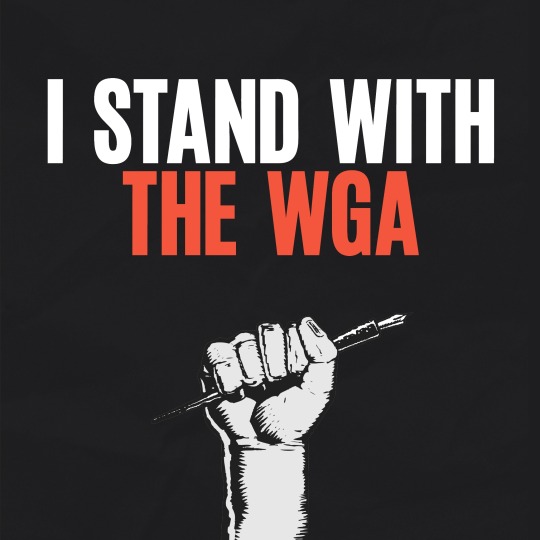
Pic of the Week:
Solidarity!
5 notes
·
View notes
Text
BW's Saturday Article Link> Tracing The Dying Of US Comics
BW's Saturday Article Link> Tracing The Dying Of US Comics
I’m not ready to call the Big Two of comics dead because I still see an opening if someone is clever enough to utilise it and is in position to do so. We just need to find those people, which is looking less and less likely. However, charting the path of DC and Marvel’s slow decay is more than modern politics and can actually be tracked to a change in focus for an industry that has never had…
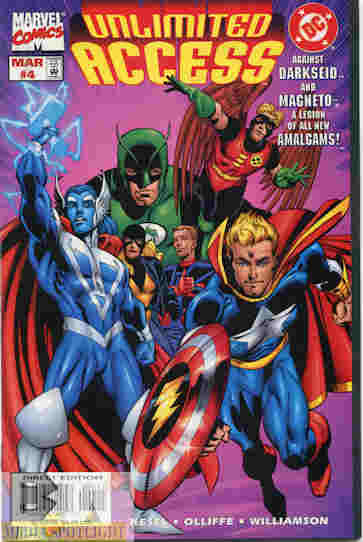
View On WordPress
0 notes
Text
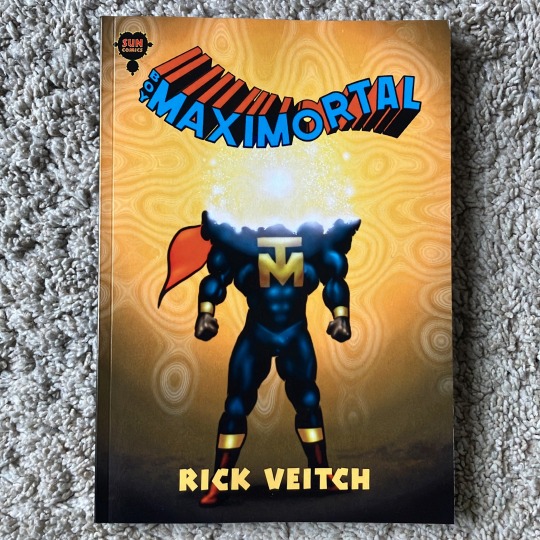
Rick Veitch: Boy Maximortal (2023)
#rick veitch#king hell#heroica#superhero#superman#comics industry#sun comics#allen dulles#mk ultra#cg jung#john f kennedy#dr strangelove#aldous huxley#ubermensch
0 notes
Text
Today, a lot of the air in comic industry discourse is being gobbled up by an op-ed written by Phil Boyle, the owner of the Coliseum of Comics chain down in Flordia.
In the article, Phil has a few choice words for Marvel and DC, marking the entities as destructive forces to his business. He acts as a spokesperson for retailers as an entity, and isolates a few problems that he sees as points of contention, noting that if either company want to have a market in 2 years, they should heed his words and make a few changes.
Special shoutout to this graphic:
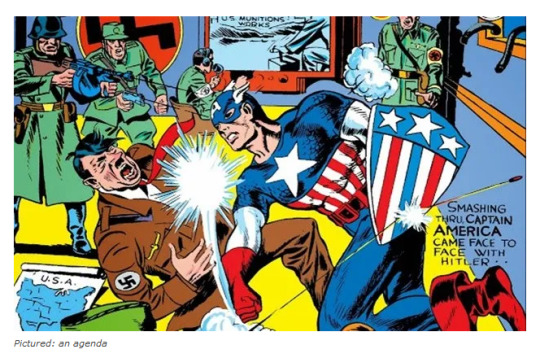
[classic picture of captain america punching hitler in the face during his first appearance. The article author has added the caption "Pictured: an agenda"]
0 notes
Text
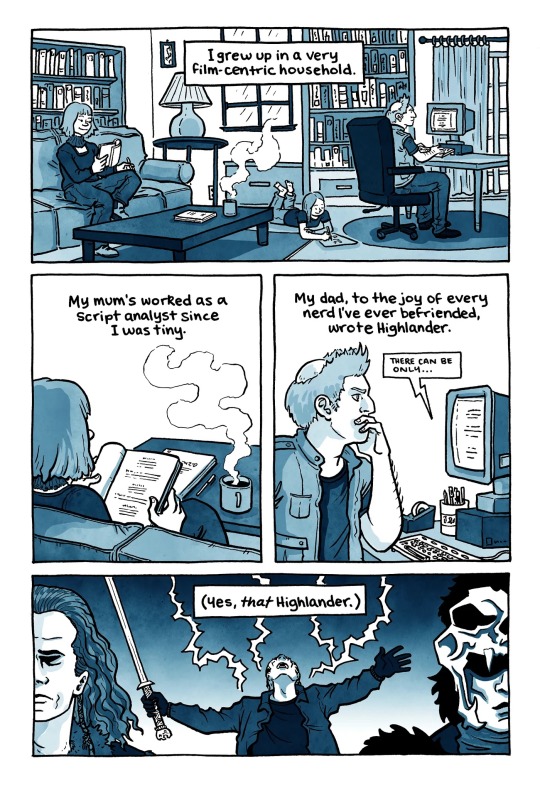
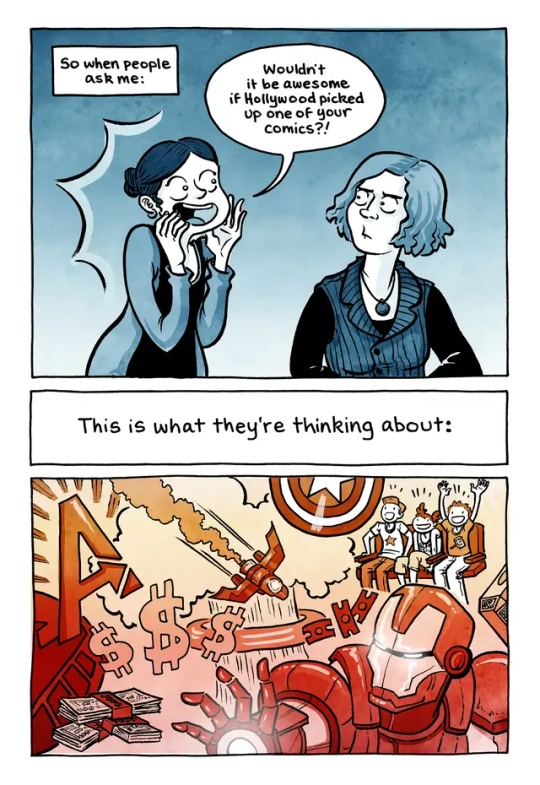

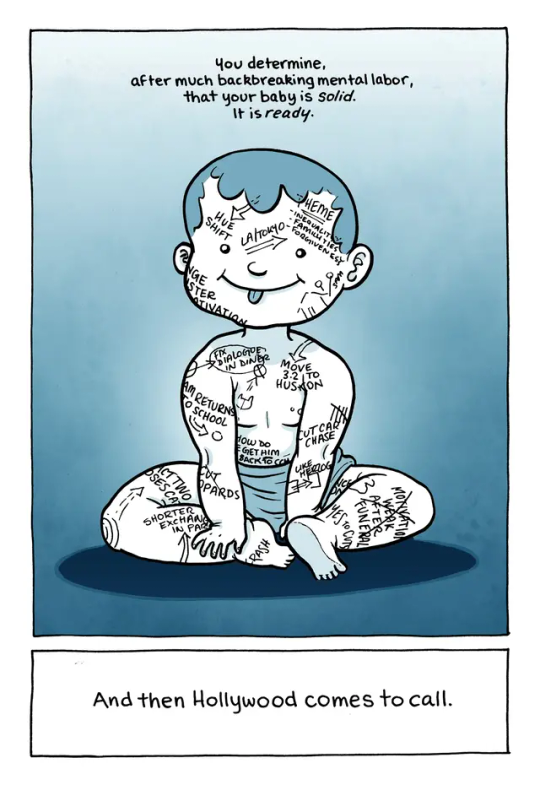
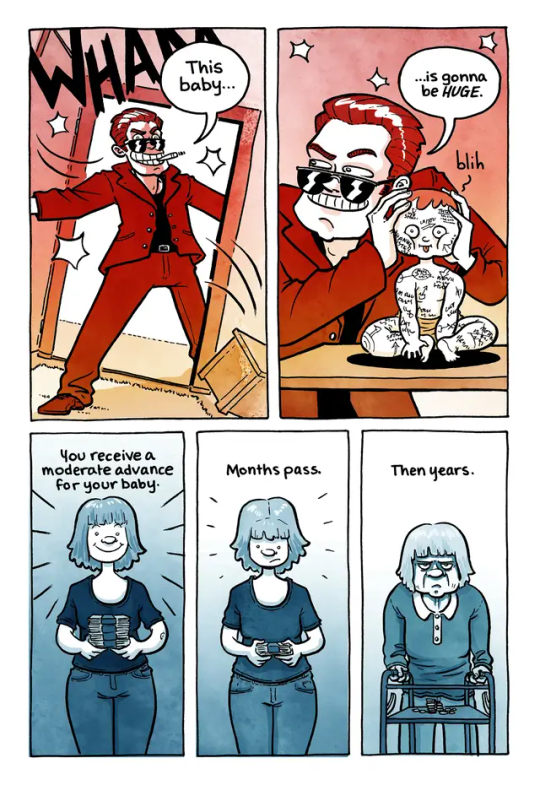
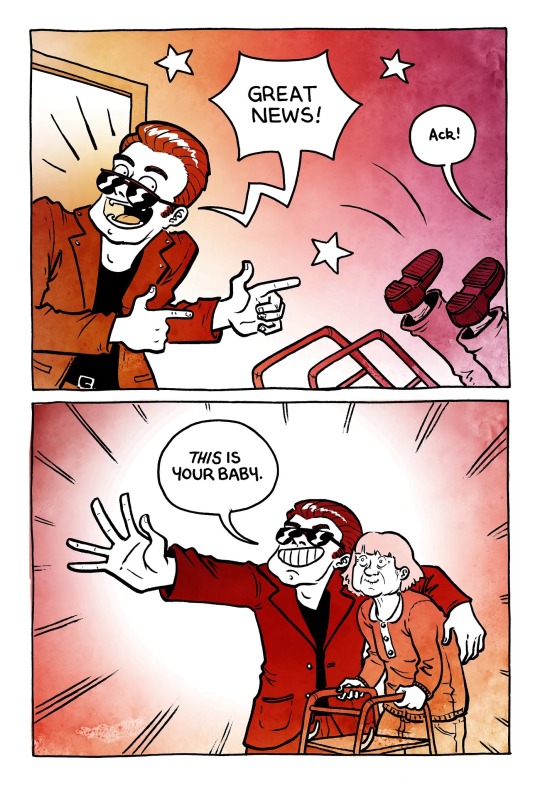

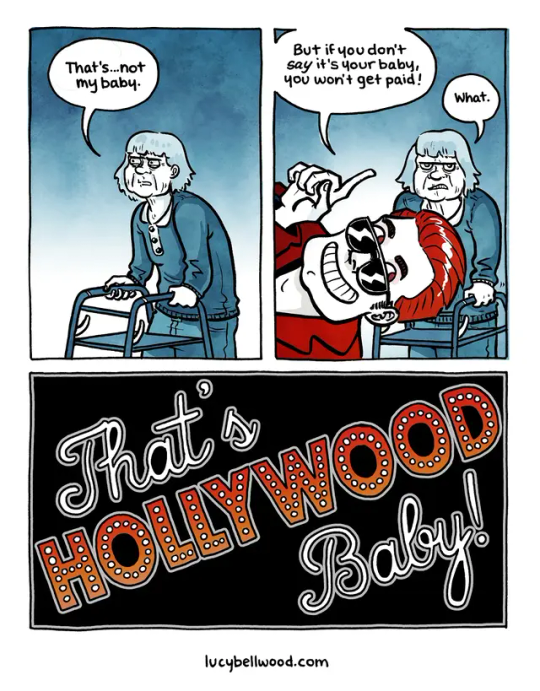
Another piece I did for The Nib back in 2015! Gonna keep posting these until they shut down at the end of the summer. It was such a treat to hear that Matt and the whole editorial team just won an Eisner for their work on the magazine and website. Much-deserved.
Anyway: this is a parody and isn't representative of every screenwriter's experience, but it certainly feels relevant with all the strikes rolling out right now. Did you know what kind of credit you get on a film directly impacts how much you're paid? For writers you'll see "created by," "written by," "story by," and all sorts of other things, all of which translate to different levels of compensation! (Highlander, for example, has Story by Gregory Widen and Screenplay by my dad and his writing partner, Larry Ferguson.) The Writer's Guild is often responsible for arbitrating those decisions. They have a whole MANUAL to help writers understand the process. It rules.
Thanks, WGA. Thanks, The Nib. (And you can always make more of these comics possible on Patreon.)
#hollywood#do the write thing#wga strike#wga strong#film credits#highlander#the nib#comics#personal work#babies#film industry#lucy bellwood
11K notes
·
View notes